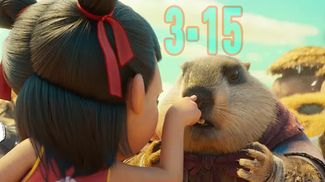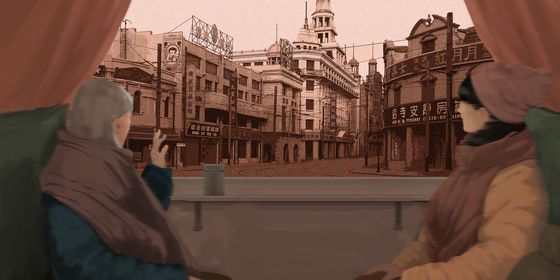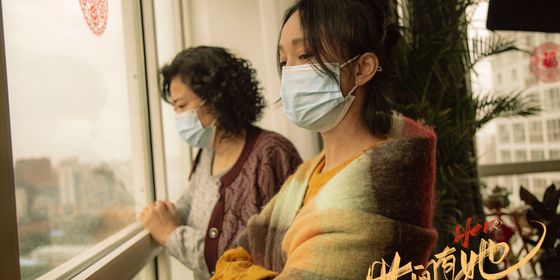A bittersweet tale of two of the most important writers of 20th century China
There’s an underlying sense of woe that pervades Tang Wei’s portrayal of Zhang Naiying, known best by her pen name Xiao Hong ( 萧红 ), in Ann Hui’s newest film The Golden Era, one might point to its source as perhaps the resentful literary genius who was upstaged by her male counterparts due to the times and nature of her work. And yet, from Tang Wei’s subtle laughter and explorations of joy, it’s apparent that this woe is far deeper seated than simple resentment. It’s complex, multidimensional and is interwoven throughout everything in The Golden Era and, at the same time, so delightfully hard to finger. It’s this complex melancholy, combined with Hui’s experimental directorial prowess that gives The Golden Era its nuanced, bittersweet, but balanced air.

Xiao Hong (Tang Wei) and Xiao Jun (Feng Shaofeng) are kindred spirits in this biopic
The story of Xiao Hong is a rather sad one—her works were sometimes autobiographical, others focused on speaking on behalf of the peasantry are considered key insights into the plight of women in early modern Chinese society. At the same time, she was a writer of unparalleled sensitivity that often led her away from the path of political hand-wringing that many of her peers had long marched down. Her writing style is considered languid and complex—lamenting beauty not out of spite but for its ephemeral nature yet still unable to extricate herself from its intensity. Even so, Xiao Hong was a student of the May Fourth Movement, and though many of her works demonstrated her dedication to her interpretations of socialism, she never saw the rise of the Communist Party to the helm of China. She died after an improper surgery in Hong Kong during the wartime chaos in 1942.

Tang Wei portrays Xiao Hong as a quiet, introverted lady of letters
The bittersweet aspects of her life were not just relegated to her final years; Xiao Hong was born in 1911 to a landowning family. When she fled to Beijing to escape an arranged marriage, she was tracked down by her spiteful lover and left pregnant and penniless in a hotel. It was here that she met Xiao Jun ( 萧军 ), a newspaper journalist with whom she would embark down a tumultuous yet exciting life that took her across China to Japan and finally to Hong Kong, where she would find her untimely demise. Over the course of her lifetime, Xiao Hong would travel to Chongqing, Wuhan, Beijing, Shanghai, Harbin, Qingdao, Tokyo, and Manchuria, as she continued to write, reflecting on her life, and the plight of the Chinese people. The great literary mind Lu Xun ( 鲁迅 ) even told her that she was to surpass the legendary Ding Ling as one of the greatest female Chinese writers of the modern age.
Xiao Hong: What’s your philosophy of love?
Nǐ duìyú ài de zhéxué shì zěnme jiěshì ne?
你对于爱的哲学是怎么解释呢?
Xiao Jun: What philosophy? Either you love…or you ditch the whole business.
Shěnme zhéxué? Ài biàn ài, bú ài biàn diūkāi.
什么哲学?爱便爱,不爱便丢开。
Xiao Hong: What if you can’t do that?
Yàoshi diūbukāi ne?
要是丢不开呢?
Xiao Jun: Then you’re stuck with it.
Diūbukāi jiù rèn tā diūbukāi ba.
丢不开就任它丢不开吧。
It’s a story that could have easily been co-opted and turned into an anti-Japanese and pro-Communist flick by today’s propagandists stirring up the proverbial pot. And yet Hui, with enormous dedication, forgoes the pressures to succumb to this angle in The Golden Era, choosing instead to portray the story of Xiao Hong as truthfully as history will allow. What this means is that the varying accounts of Xiao Hong left from history—her peers, lovers, and acquaintances—also serve as narrators, as well as active participants in the story, breaking the fourth wall to speak directly to the audience. It’s a commendably masterful attempt at admitting the flawed, ambiguous (and human) nature of history, especially during 1930s wartime China.

Xiao Hong suffered terrible illness in her final days
But it’s the genuine nature of interaction between Tang Wei, who portrays Xiao Hong and the rest of the cast, including veteran Feng Shaofeng as her lover Xiao Jun, and Wang Zhiwen as the legendary Lu Xun, that brings the film to the forefront of Mainland cinema. You’re pleasantly left wondering how much of the bumbling around is actually scripted, a testament to the strength of Hui’s cast. Indeed, The Golden Era is nuanced beyond the scope of most mainstream mainland cinema: the editing leaves out the polished gleam that often accompanies most Mainland historical dramas and the costume work and set design aims at creating an ethos that highlights both the romantic realization of Xiao Hong’s meandering gaze and the realism that it deserves. The film jauntily cuts back and forth across time, with characters in Shakespearian fashion, pausing their dialogues to clarify their actions to the audience, and to even predict their owns deaths. By smashing the linear theatrical realism of conventional storytelling, Hui valiantly attempts to rebuild the palace of truth. It’s a truly nuanced and unconventional method of dramatization and historical narration.
It is such nuance that forms the core threads of this complex and paradoxical woe, found woven into The Golden Era. A woman, who, while untethered to the social mores of her time, still found herself clinging to society in order to understand herself, her country, her lovers and her detractors– and that she was neither able extricate nor fully devote herself from or to these commitments. Perhaps, Hui seems to wonder, this is what her Golden Era was to be: a time where both beauty and evil were simultaneously present; a time that should have been hers for the taking, but where she was taken instead; a time where she would come to recognize the illusion of her agency. Perhaps, it was also a time for bittersweet remembrance of what should have been rightfully her Golden Era.
“The Golden Era” is a story from our newest issue, “Military”. To continue reading, become a subscriber and receive the full magazine. Alternatively, you can purchase the digital version from the iTunes Store.












